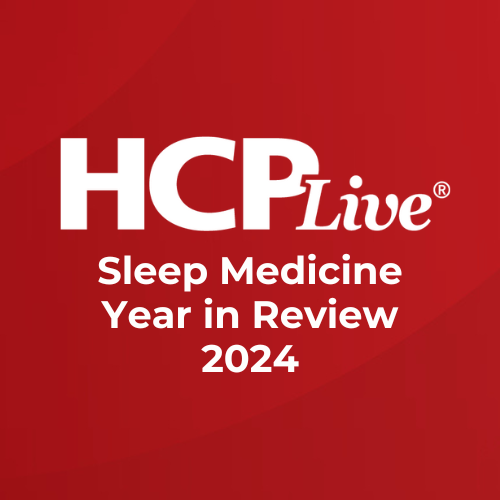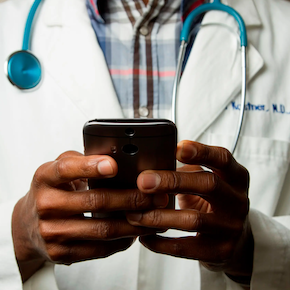News
Article
Sleep Medicine Year in Review: 2024
Author(s):
Key Takeaways
- Tirzepatide and sodium oxybate received FDA approval, expanding treatment options for obstructive sleep apnea and pediatric narcolepsy, respectively.
- Pitolisant was approved for pediatric narcolepsy, and Dreem 3S received authorization for algorithm updates, enhancing sleep disorder insights.
From FDA approvals to updated guidelines, 2024 brought transformative advancements in sleep medicine, offering new hope for managing complex sleep disorders.

Looking back on 2024, sleep medicine has seen a year full of breakthroughs and updates transforming patient care. From US Food and Drug Administration (FDA) approvals to new clinical guidelines, we have seen fresh approaches to managing complex sleep disorders.
Highlights include tirzepatide’s approval for obstructive sleep apnea in obesity and sodium oxybate’s expanded use for pediatric narcolepsy, both offering exciting new treatment options. This Year in Review captures the top stories that made 2024 a pivotal year in sleep medicine.
FDA Approvals, Authorizations
FDA Approves Tirzepatide for Obstructive Sleep Apnea in Obesity
The FDA has approved tirzepatide (Zepbound) as the first prescription treatment for moderate-to-severe obstructive sleep apnea (OSA) in adults with obesity. Clinical trials demonstrated tirzepatide’s effectiveness, with patients experiencing up to 20% weight loss and significant reductions in breathing interruptions. In the SURMOUNT-OSA trial, 42% of patients achieved OSA remission or mild symptoms after one year, compared to 16% on placebo. Combining tirzepatide with PAP therapy yielded even better outcomes.
FDA Approves Sodium Oxybate for Cataplexy, Excessive Daytime Sleepiness in Pediatric Narcolepsy
The FDA approved sodium oxybate (LUMRYZ) for children aged ≥ 7 years with narcolepsy to treat cataplexy and excessive daytime sleepiness, expanding its use to pediatric patients. Unlike earlier treatments requiring a second nighttime dose, LUMRYZ offers a single bedtime dose, reducing disruptions. Already approved for adults, LUMRYZ provides younger patients with a more convenient treatment option, addressing key challenges faced by families and caregivers managing narcolepsy.
FDA Approves Pitolisant for Excessive Daytime Sleepiness in Pediatric Patients
The FDA has approved pitolisant (Wakix) for the treatment of excessive daytime sleepiness (EDS) in pediatric patients aged ≥ 6 years with narcolepsy. Pitolisant, a first-in-class selective histamine 3 (H3) receptor antagonist, has been available for adults since 2019 and is now the only non-scheduled treatment for narcolepsy. The approval was based on a 5-week phase 3 trial showing significant improvements in EDS compared to placebo.
FDA Authorizes Predetermined Change Control Plan for Sleep Wearable Dreem 3S
The FDA authorized a Predetermined Change Control Plan (PCCP) for the Dreem 3S wearable, allowing algorithm updates without new 510(k) submissions, and expediting advancements. Dreem 3S, a lightweight EEG headband for in-home sleep monitoring, was validated against human experts with high accuracy in a 2020 study. Equipped with 6 dry EEG electrodes and an accelerometer, it automates sleep staging and provides an alternative to in-lab polysomnography. Beacon Biosignals plans to leverage PCCP to integrate machine learning improvements, enhancing sleep disorder insights and aiding CNS disease therapies, including major depressive disorder, through refined sleep disturbance assessments.
Updated RLS Guidelines
AASM Updates Clinical Guidelines for Restless Legs Syndrome
The American Academy of Sleep Medicine (AASM) updated its clinical guidelines for restless legs syndrome (RLS), advising against dopamine agonists due to augmentation risks, which affect 7–10% of patients annually. New recommendations include iron therapies (IV and oral) and alpha 2 delta calcium channel ligands (gabapentin, gabapentin enacarbil, pregabalin) for their proven long-term efficacy. John Winkelman, MD, PhD, chair of the AASM committee, highlighted the importance of monitoring for augmentation and tailoring treatment to minimize side effects, marking significant changes for RLS management.
Related: Changes in Restless Legs Syndrome Treatment Recommendations
Promising Phase 2 Data on Idiopathic Hypersomnia
KP1077 Is Safe, Tolerable for Improving Idiopathic Hypersomnia Symptoms
A phase 2 trial of KP1077 demonstrated its safety, tolerability, and potential to alleviate key symptoms of idiopathic hypersomnia, a rare sleep disorder marked by excessive daytime sleepiness, brain fog, and sleep inertia. Conducted by Zevra Therapeutics, the study included a 5-week open-label titration period followed by a 2-week randomized, double-blind withdrawal phase. KP1077 yielded clinically meaningful improvements in sleepiness, symptom severity, and brain fog, with benefits maintained throughout the trial. The FDA granted KP1077 Orphan Drug Designation, and Zevra plans to proceed to phase 3 trials to confirm these findings.
Related: Adrian Quartel, MD: Next Steps for Evaluating KP1077 in Idiopathic Hypersomnia
Features on Sleep Health in Dialysis, Long COVID
Lifesaving But Not Perfect: Addressing Sleep Health in Patients on Dialysis
Dialysis, a lifesaving treatment for kidney failure, often imposes a significant burden on patients’ sleep and quality of life. Experts and advocates emphasize the need for interdisciplinary care that incorporates sleep health into treatment plans. Sleep disruptions in dialysis patients stem from factors such as circadian rhythm disturbances, metabolic imbalances, and psychological stress. Experts recommend tailored approaches like cognitive behavioral therapy for insomnia and continuous positive airway pressure for sleep apnea.
COVID-19 Never Truly Goes Away: Long COVID’s Debilitating Symptoms Uproots Lives
Long COVID continues to impact millions, causing a range of debilitating symptoms, including persistent sleep disturbances. Liza Fisher, a long COVID sufferer, shared her struggle with a wide array of symptoms, including fatigue, brain fog, and sleep issues, which led her to lose her job and healthcare. Research indicates that around 40% of long COVID patients report sleep problems, and while the exact neurological causes remain unclear, long COVID likely contributes to sleep disruptions due to inflammation and its effects on the body.
Daylight Savings Transition Presents More Health Risks Than Modern Benefits
Ahead of daylight-saving time (DST), sleep experts highlighted the potential harms of the time change, including increased risks for cardiovascular events, car accidents, and mental health issues. The shift disrupts the body's internal clocks, contributing to social jetlag and misalignment between the solar, social, and circadian clocks. Experts argue that DST offers no significant benefits and can exacerbate health issues, such as stroke and heart attack risks, particularly in those with pre-existing conditions. Sleep experts advocate for permanent standard time to better align with natural rhythms.





